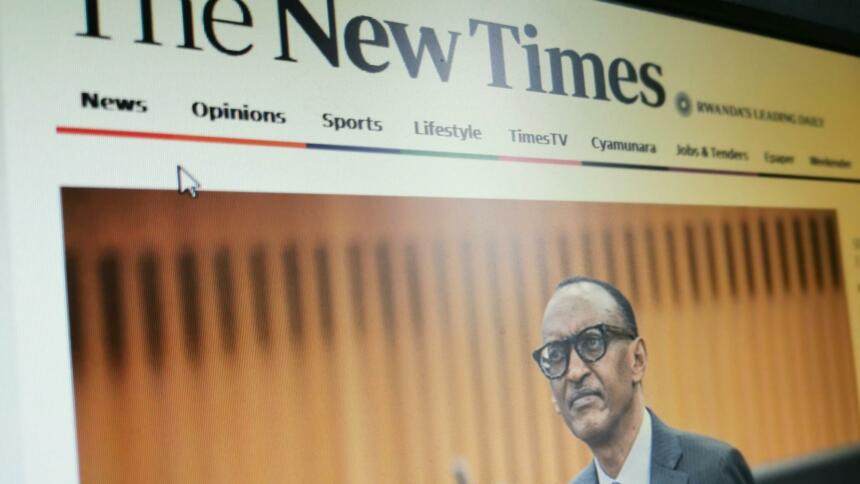The New Times describes itself as „Rwanda’s leading daily“. The paper writes in a reverent tone about President Paul Kagame, who has ruled the East African country with a firm hand for 20 years. But the gloves come off when an NGO dares to criticise Kagame’s government.
Take the example of Human Rights Watch. The group recently voiced outrage over the forced disappearance of Paul Rusesabagina, a critic of Kagame’s government.
The New Times‘ opinion pages promptly responded. „Human Rights Watch or Terrorist Rights Watch?“, a piece suggestively asked.
Such attacks are not uncommon in the New Times, says Lewis Mudge. The Central Africa Director at the NGO Human Rights Watch told netzpolitik.org that the paper frequently „serves as a mouthpiece to attack opponents of the ruling Rwandan Patriotic Front (RPF) and the executive.“
Rusesabagina alone was subject of 21 opinion pieces in the New Times over 6 months, including one titled „Rusesabagina’s megalomania has no limit“.
Yet red flags have not stopped Google from funding The New Times. The aid is part of the Google News Initiative, a global conduit for the tech company’s engagement with the media, which we investigated as part of our recently published study „Google, the media patron“.
Press funding without a free press
In Rwanda freedom of the press is heavily curtailed. In Reporters Without Borders‘ press freedom index, Rwanda ranks 155th out of 179 states.
Censorship is omnipresent and self-censorship is widespread to avoid trouble with the regime, according to Reporters Without Borders. The genocide of the Tutsi minority in 1994 was abused by the government to take action against critical media for allegedly „divisive“ reporting, the NGO says.
But the difficult environment has not stopped Google from handing out cash.
The New Times was one of the winners of Google’s Innovation Challenge for the Middle East, Turkey and Africa. With the help of the digital giant, the newspaper launched the project „Readers‘ Call on the News“. Similar projects have received up to 150,000 dollars from Google.
The project is meant to collect ideas for stories from readers, journalists from the paper then help to write up. The project „will create a bond again to make sure readers‘ ideas are heard, covered and in the end, that better news is produced about Rwanda“, Google’s website states.
It is not Google’s first funding grant to media. The search engine giant announced a 60-million-euro fund for publishers in France in 2013. From 2015, Google’s Digital News Initiative gave 140 million euro in cash gifts to media innovation projects in the whole of Europe, and in 2019 Google promised a 300-million-dollar grant to support journalism around the world.
In Africa, Google has supported eight projects in 2020, one of which is in Rwanda. This Google initiative has puzzled observers of the local media landscape.
„It empowers one-sided information“
Several human rights advocates we spoke to share concerns about Google’s funding decision in Rwanda. While Google was free to allocate funding where it deems fit, it would be „useful to understand the criteria“, Sigi Waigumo Mwanzia of Article19, a freedom-of-expression advocacy group, said in an e-mail to netzpolitik.org.
In the Rwandan context, funding to pro-government media might lead to negative outcomes for free speech, Waigumo Mwanzia said. „It empowers what some consider to be the government’s mouthpiece with more armour to continue promoting pro-government and often one-sided information“.
Meanwhile, such funding could „disempower media outlets without this resource base by reducing, on the face of it, their ability to combat any one-sided narratives which are churned out by NT and other pro-government outlets.“
In response to netzpolitik.org, Google referred to the governance structure of its Innovation Challenges. Its funding decisions are taken by a mixed jury of local media representatives and Google’s funding team.
„We have clear, public guidelines for eligibility and governance for all our GNI Innovation Challenges and we publicly share information about who we fund“, the company said in an written reply.
In the Innovation Challenge for the Middle East, Turkey and Africa, Google distributed a total of about 2 million US dollars to 21 projects. Projects received up to 150,000 dollar from Google, but the company does not reveal exact figures.
Who belonged to the jury is as unclear as the criteria by which the winners were selected. The Innovation Challenges website does not mention any concerns about press freedom, independence or journalistic integrity in the selection process.
„Best case scenario: Someone at Google messed up“
„The New Times’ reporting is not regarded as independent“, Lewis Mudge with Human Rights Watch explained.
„Human rights defenders, especially those who publicly denounce violations of freedom of expression or association, are also targeted by the government and the [ruling party] RPF. The New Times serves as a means to amplify those attacks and attempts to de-legitimize critics.“
There are at least two possibilities, says Mudge. „Best case scenario: Someone at Google messed up and no due diligence was conducted. This is stupefying considering the resources Google has.“
The worst case scenario for the NGO representative, however, is that „Google is signalling that it is funding repression and supports the muzzling of free speech, the closing of political space in Rwanda and attacks on political opponents and human rights defenders.“
„Even if we assume it’s the best case scenario, the outcomes still follow this trend, so it’s pretty shocking that Google has taken this decision and stands by it.“
Journalism scholar and long-time Rwanda watcher Allan Thompson from Carleton University in Canada said that it would have been better for local media if Google had promoted more than just one news outlet.
While the New Times could be credible on some of its coverage and had a few „journalists of good conscience“ working there, Thompson said the paper was „clearly pro-government“ and that the President’s office had a direct say in certain news stories.
„My criticism is not so much that they fund the New Times, but they should have looked for other, more independent news organizations that need support to keep running.“ The New Times as establishment outlet was least in need of support compared to media such as Igihe and Kigali Today, Thompson said.
Funding to a Sheikh’s paper
The Google News Initiative also pours money into other places with limited press freedom. The United Arab Emirates ranks just a little better than Rwanda, coming in on 131 out of 180 countries on RSF’s press freedom index.
In the Emirates, Google recently gave funding to the English-language newspaper The National, which is owned by a member of the ruling family of Abu Dhabi, the Emirate’s capital.
„As such, it would be extremely difficult to make the case that The National has any kind of editorial independence (and I don’t think it ever pretends to)“, Middle East scholar Christopher M. Davidson said in an e-mailed reply to a question by netzpolitik.org.
The paper „is probably the best of the other English language newspapers in the region, and does sometimes cover critical topics (e.g. migrants‘ rights issues, corruption, etc.). Google probably sees it as its best bet in the UAE“, Davidson said.
The National started in 2008 with the ambitious goal of becoming the „New York Times of the Middle East“. But only a few years later, journalists hired from abroad left the paper, criticizing self-censorship and a lack of independence.
Journalists in the Emirates face severe legal constraints. The least criticism of the regime by journalists or bloggers is likely to lead to charges of defamation, insulting the state or posting false information with the aim of damaging the country’s reputation, notes Reporters without Borders.
Despite the hostile climate for independent journalism, Google still decided to fund the pro-regime paper. The money helped The National in developing a program to create audio versions of its stories.
Google reversed controversial grant in Hungary
This is not the first time that Google’s funding has attracted criticism. As part of its earlier, Europe-only Digital News Initiative, Google gave 50,000 euro to a project at the Origo news site in Hungary.
Origo belongs to a family close to Prime Minister Viktor Orban, and the site regularly publishes attacks on migrants and the philanthropist George Soros. A New York Times story on Origo is entitled: „The Website That Shows How a Free Press Can Die“.
After a scathing report by the blog MediaPowerMonitor, Google quickly withdrew its funding commitment to Origo. After „further examination“ Google decided not to support the Hungarian news website after all, the company said in response to an inquiry from the media blog NiemanLab.
Google’s gifts to the media are already raising questions about the independence of the recipient media in democratic societies, as we have highlighted in our study. But if pro-government media in authoritarian states are also being promoted in the same way, Google must ask itself whether it has crossed a red line.





0 Ergänzungen
Dieser Artikel ist älter als ein Jahr, daher sind die Ergänzungen geschlossen.